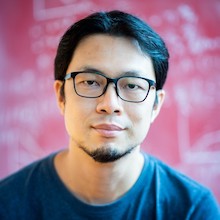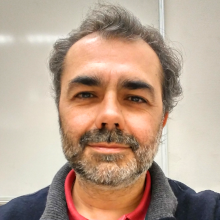
Workshop
The Distributed Ghost
Cellular Automata, Distributed Dynamical Systems, and Their Applications to Intelligence
at ALIFE 2023, hybrid live/virtual event
Workshop date: July 27, 2023 at 10:10-11:30 and 13:00-14:20 - Sapporo, Japan
Workshop submission deadline: June 1st, 2023 (extended)
Organizers
Stefano Nichele, Østfold University College, Norway
Hiroki Sayama, Binghamton University, USA
Chrystopher Nehaniv, University of Waterloo, Canada
Eric Medvet, University of Trieste, Italy
Mario Pavone, University of Catania, Italy
This workshop in an initiative of the IEEE CIS Task Force on Artificial Life and Complex Adaptive Systems.
Scope of the workshop
Distributed dynamical systems such as Cellular Automata and Random Boolean Networks (and everything in between), have long been used as models to understand computation and self-replication in biology, morphogenesis, gene regulation, life-as-it-could-be, and the universe.
Such complex systems models have been extensively studied mathematically and experimentally in all their different variations, such as synchronous and asynchronous updates, dynamic automata networks that can grow and change their structure including components and interconnection topology, as well as their robustness.
In [1], A. Wuensche investigates the basins of attraction of cellular automata (CA) and random Boolean networks (RBN), and even suggests that they are The Ghost in the Machine.
Recent advances of such models, including continuous CA such as Lenia and neural-based CA, have been proposed as substrates to study the emergence of a more general intelligence [2, 3], thanks to their propensity to support properties such as self-organization, emergence, and open-endedness.
This workshop aims at bridging the gap between the ALife community working with CA and distributed dynamical systems, and the broader AI community interested in exploring concepts from complex systems/self-organization/artificial life for AI research and machine learning, including modular robotics such as voxel-based robots.
[1] Wuensche, A. (1994). The Ghost in the Machine: Basins of Attraction of Random Boolean Networks. Artificial Life III: SFI Studies in the Sciences of Complexity, vol. VII. Addison-Wesley.
[2] Hamon, G., Etcheverry, M., Chan, B. W. C., Moulin-Frier, C., & Oudeyer, P. Y. (2022). Learning sensorimotor agency in cellular automata.
[3] Gregor, K., & Besse, F. (2021). Self-organizing intelligent matter: A blueprint for an AI generating algorithm. arXiv preprint arXiv:2101.07627.
Program - July 27th, 2023
10:10 - Welcome and Introduction
10:15 - Keynote 1: Bert Chan (Google Deepmind), Strange Attractors of Strange Attractors, on-site
10:40 - H. Derets, C. Nehaniv. Survival of Populations under Habitat Change to Potentially Less Favorable Conditions: A Study with Darwinian Cellular Automata, digital, PDF
10:50 - S. Pontes-Filho, S. Nichele, M. Lepperød. Critical Neural Cellular Automata, on-site, PDF
11:00 - M. Kvalsund, K. Ellefsen, K. Glette, S. Pontes-Filho, M. Lepperød. The distributed neocortex: How neuroscience can inspire distributed AI systems, on-site, PDF
11:10 - H. Sayama. Evolution of Self-Replicators within Cellular Automata: 25 Years After Evoloops, on-site, PDF
11:20 - B. Yang. Emergence of Self-Replicating Hierarchical Structures in a Binary Cellular Automaton, on-site, PDF
11:30 - Lunch Break
13:00 - T. McCourt, I. Fiete, I. Chuang. Noisy dynamical systems evolve error correcting codes and modularity, digital, PDF
13:10 - M. Biehl, N. Virgo. The game of life in a glider's frame of reference, on-site, PDF
13:20 - C. Bohm, C. Reeves, J. Schossau. Wire Brains: an extension to Wireworld allowing for evolvable digital brains, on-site, PDF
13:30 - D. Devlin, A. Ganley, N. Takeuchi. Evolution of morphogenesis can drive the emergence of stem to non-stem cell differentiation, on-site, PDF
13:40 - G. Nadizar, E. Medvet, K. Walker, S. Risi. Neural Cellular Automata Enable Self-Discovery of Physical Configuration in Modular Robots Driven by Collective Intelligence, on-site, PDF
13:50 - Keynote 2: Andrea Roli (University of Bologna), Shaping attractor landscapes: from the satisfiability problem to Boolean network controlled robots, digital
14:15 - Summary and Goodbye
Keynote Speakers
Bert Chan (Google Deepmind)

Title: Strange Attractors of Strange Attractors
Abstract:
Strange attractors are everywhere in dynamical systems, from the simple Lorenz Attractor to the complex biosphere and human brain. Even stranger, for systems that are highly parameterized, there could be "strange attractors of strange attractors", that is the tendency of the infinite variants of attractors to group into manifolds and form their own basins of attraction. Using Lenia (continuous cellular automata) as an example, we try to track down the ghost in the distributed dynamical machine.
Bio:
Bert Chan is a Researcher Engineer at Google DeepMind (formerly Brain team) based in Tokyo. He was also an external collaborator at Inria, and a visiting researcher at the Institute for Advanced Study. Bert's research interests include artificial life, complex systems and evolutionary computation. He discovered a continuous cellular automata called Lenia, which received the Outstanding Publication of 2019 award by the International Society for Artificial Life.
Andrea Roli (University of Bologna)

Title: Shaping attractor landscapes: from the satisfiability problem to Boolean network controlled robots
Abstract:
Boolean networks have been introduced by Stuart Kauffman as genetic regulatory networks more than fifty years ago. Since then, these models have been thoroughly studied in many variants and in a plethora of studies, mainly concerned with cell dynamics modelling. The use of Boolean networks to model cell dynamics suggests a visionary approach: as cells are capable of adapting their behaviour depending on the environmental conditions, we may apply the metaphor of attractor landscape to design specific Boolean network dynamics that can match the attractor landscape required for attaining a target behaviour in an artificial system. In this talk I will review some (personal) investigations on the possibility of shaping the attractor landscape of a Boolean network to solve hard combinatorial problems, such as SAT, and to equip robots with a flexible and robust controller. As for the robotic context, I will briefly discuss approaches for both offline and online adaptation. In the first case, Boolean networks are designed by an evolutionary process that shapes the attractors and their transitions. In the second case, Boolean networks are considered as generators of dynamics that are exploited and blended by finding a suitable mapping between robot sensors and network nodes.
Bio:
Andrea Roli is assistant professor at Università di Bologna. His research areas are Artificial Intelligence and Complex Systems, with focus on biological models, biorobotics, and collective intelligence. His main current research activities are gene regulation models for robot control and information theory techniques for the analysis of complex systems dynamics. Andrea Roli teaches courses in computer science basics, artificial intelligence and complex systems. He is member of the Italian Association for Artificial Intelligence (AI*IA). He collaborates with IRIDIA (Institut de Recherches Interdisciplinaires et de Développements en Intelligence Artificielle), Université libre de Bruxelles and with the Namur Center for Complex Systems (NAXYS). He is also ECLT fellow (European Centre for Living Technology, Venice).
Submission instructions
Submissions for contributed talks are in the form of extended abstracts (maximum 2 pages, not including references).
The workshop accepts both published and novel works. In case your work has been published earlier, please specify this during the submission process.
Accepted abstracts will be published in a booklet hosted on this website.
We plan to prepare a special issue in NEJCS (free of charge) with extended versions (full papers) of the novel contributions from the workshop.
Submission via EasyChair at this link.
Important dates
Submission: June 1st, 2023
Notification: June 15th, 2023
Contacts
Please feel free to contact us:
Stefano Nichele: stefano.nichele@hiof.no
Hiroki Sayama: sayama@binghamton.edu
Chrystopher Nehaniv: chrystopher.nehaniv@uwaterloo.ca
Eric Medvet: emedvet@units.it
Mario Pavone: mpavone@dmi.unict.it
